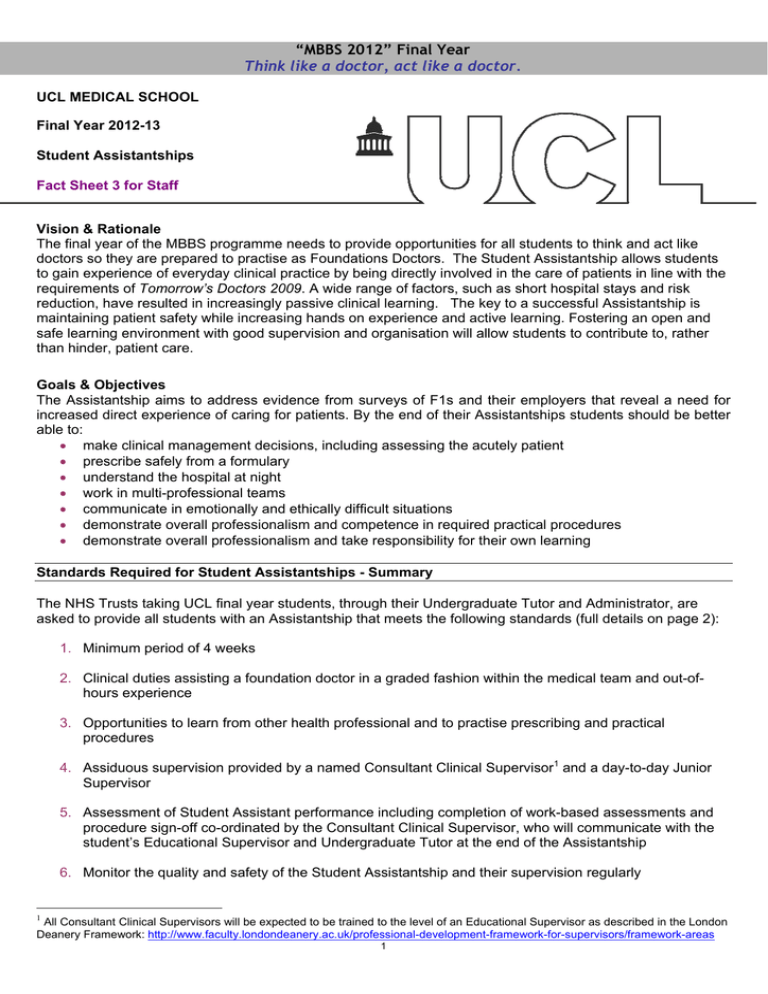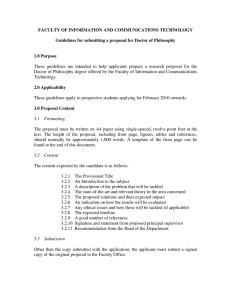“MBBS 2012” Final Year
advertisement

“MBBS 2012” Final Year Think like a doctor, act like a doctor. UCL MEDICAL SCHOOL Final Year 2012-13 Student Assistantships Fact Sheet 3 for Staff Vision & Rationale The final year of the MBBS programme needs to provide opportunities for all students to think and act like doctors so they are prepared to practise as Foundations Doctors. The Student Assistantship allows students to gain experience of everyday clinical practice by being directly involved in the care of patients in line with the requirements of Tomorrow’s Doctors 2009. A wide range of factors, such as short hospital stays and risk reduction, have resulted in increasingly passive clinical learning. The key to a successful Assistantship is maintaining patient safety while increasing hands on experience and active learning. Fostering an open and safe learning environment with good supervision and organisation will allow students to contribute to, rather than hinder, patient care. Goals & Objectives The Assistantship aims to address evidence from surveys of F1s and their employers that reveal a need for increased direct experience of caring for patients. By the end of their Assistantships students should be better able to: • make clinical management decisions, including assessing the acutely patient • prescribe safely from a formulary • understand the hospital at night • work in multi-professional teams • communicate in emotionally and ethically difficult situations • demonstrate overall professionalism and competence in required practical procedures • demonstrate overall professionalism and take responsibility for their own learning Standards Required for Student Assistantships - Summary The NHS Trusts taking UCL final year students, through their Undergraduate Tutor and Administrator, are asked to provide all students with an Assistantship that meets the following standards (full details on page 2): 1. Minimum period of 4 weeks 2. Clinical duties assisting a foundation doctor in a graded fashion within the medical team and out-ofhours experience 3. Opportunities to learn from other health professional and to practise prescribing and practical procedures 4. Assiduous supervision provided by a named Consultant Clinical Supervisor1 and a day-to-day Junior Supervisor 5. Assessment of Student Assistant performance including completion of work-based assessments and procedure sign-off co-ordinated by the Consultant Clinical Supervisor, who will communicate with the student’s Educational Supervisor and Undergraduate Tutor at the end of the Assistantship 6. Monitor the quality and safety of the Student Assistantship and their supervision regularly 1 All Consultant Clinical Supervisors will be expected to be trained to the level of an Educational Supervisor as described in the London Deanery Framework: http://www.faculty.londondeanery.ac.uk/professional-development-framework-for-supervisors/framework-areas 1 “MBBS 2012” Final Year Think like a doctor, act like a doctor. Supervision Each student will have • • Consultant Clinical Supervisor - A named consultant2 with overall responsibility for the Assistant who will: • provide an initial 1:1 induction meeting and introduction to the clinical / ward teams • foster a safe and open leaning environment • identify a Junior Supervisor and ensure the Student Assistant is adequately supervised at all times • maintain patient safety by assessing and minimising any risk to patients • ensure the Student Assistant and their Junior Supervisor can contact her/him if necessary • co-ordinate assessment of student’s performance in liaison with the Junior Supervisor and provide feedback to the student and to their Educational Supervisor during, and at the end of the Assistantship • review the Assistant’s work at least twice per week • seek and respond to their Student Assistant’s feedback to hone skills in clinical supervision Junior Supervisor – A junior doctor, identified and supported by the Consultant Clinical Supervisor who will : • provide day-to-day responsibility for allocating and supervising the work of the Assistant • assess Assistant’s readiness to perform clinical duties and provide immediate advice and support • meet with the Assistant and review their work at least twice in each shift (and be available at other times) • ensure they fulfil their out-of-hour requirements • monitor the Assistantship’s performance and provide constructive feedback • identify areas for remediation and alert the Consultant Clinical Supervisor of any immediate concerns • learn with the Assistant and respond to their feedback to develop skills in clinical supervision Learning environment activities during the Assistantship The programme will vary with the work of the firm, but will include aspects of each of the following: Clinical duties – patient care Student Assistants will be expected to integrate into the medical team, carrying out tasks of increasing complexity and responsibility as the assistantship progresses. Their duties will include: Clerking and reviewing • Making patient safety and care their first priority at all times • Clerking new admissions and clearly identifying current clinical problems • Making a provisional plan for current clinical problems and agreeing this with their supervisor before acting on it • Taking part in the daily ward round on patients each morning (usually with their Supervisor), examining patients and their charts to check on progress • Liaising with nursing staff. Ward rounds and Clinical meetings • Preparing for and making presentations on ward rounds • Participating actively in handover meetings and MDTs. • Researching a patient’s conditions fully reviewing the current understanding and treatment • Discussing and enacting the patient’s management plans after meetings and rounds. Procedures • With consent and after a period of direct supervision undertaking any necessary procedures listed in the Phase 3 Core Syllabus. • Ensuring their Procedures Record is completed. • Where possible, accompanying their patients to investigations or procedures, such as endoscopy or imaging. 2 All Consultant Clinical Supervisors will expected to be trained to the level of an Educational Supervisor as described in the London Deanery Framework: http://www.faculty.londondeanery.ac.uk/professional-development-framework-for-supervisors/framework-areas 2 “MBBS 2012” Final Year Think like a doctor, act like a doctor. Drug and Fluid Charts • After a period of instruction filling in drug and fluid charts (to be reviewed and signed only by a qualified doctor). • Discussing their charts with the ward pharmacist. Investigations • Planning investigations for their patients and initiating them in consultation with their Junior Supervisor if agreed • Summarizing results and justifying their choice of investigations and their cost-effectiveness on the ward rounds Writing in the patients notes • Writing in clinical notes in their patient’s record every day. • Printing their name and signing and dating each entry, clearly identifying themselves as a medical student. • Notes should be reviewed and countersigned by a qualified doctor at least once in 48 hours and prior to discharge or transfer. Discharge planning • In liaison with nursing staff and their Junior Supervisor taking part in the discharge planning meetings of patients • Preparing the discharge letter to the general practitioner (this must be agreed and counter-signed by their supervisor) • Students may be encouraged to follow-up discharged patients by phone at home and or contact their GP to review how the patient has coped. Working hours and Out of Hours requirements In order to become familiar with the hospital at night a gain experience in the initial assessment of the acutely ill patient during their Assistantship they will need to: • • • Work the same shifts and hours as an F1 doctor on their Supervising Consultant’s team including oncall rota. Undertake at least 2 evening or night shifts (depending on the hospital working pattern) during their Assistantship. In addition they will need to work one full weekend (with their Junior Supervisor, if possible) at some point during their 12 week DGH attachment. Half-day / Wednesday afternoon The Student Assistant is still entitled to a free half day per week but this must be negotiated with their Supervising Consultant at the initial induction meeting. Assistants may be encouraged (but, due to UCL regulations, not obliged) to exchange a Wednesday afternoon for another session if their firm is busy at this time. Formal Teaching During the period, the student is not required to attend any formal teaching unless this does not adversely affect clinical responsibilities. Appropriate tasks: Clerk acute admissions in the medical notes including the formulation of a differential diagnosis and management (investigation and therapeutic) plan. Completion of drug charts but not the signing of any such charts. Completion of investigation requests and liaison with imaging and pathology departments following approval by supervising doctor. Recording of ward rounds in the medical notes Presentation of patients on ward rounds Chasing of the results of completed investigations and the recording of these in the medical notes. Liaison with Allied Health Care Professionals. Basic procedures such Venepuncture, cannula insertion, preparation of IV infusions (after initial direct supervision and sign-off) More advanced procedures out only under direct supervision such as catheterisation.. Acting as a member of the Cardiac Arrest Team 3 Inappropriate tasks: Initiation or modification of any management plan without the prior agreement of the supervising doctor including the requesting of investigations. Signing of prescription charts. Confirmation of death & completion of death certificates


